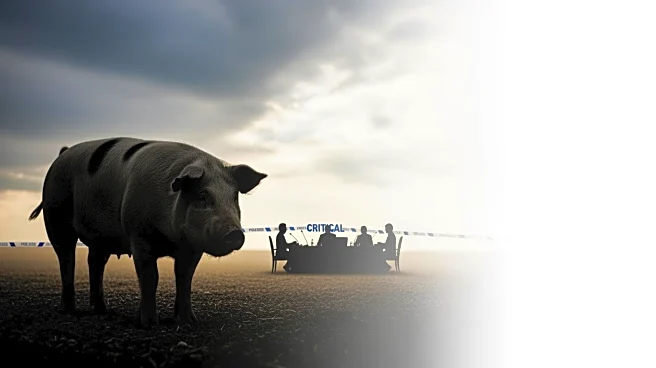What's Happening?
Taiwan has reported its first case of African swine fever, leading to the culling of 195 pigs from an affected farm in Taichung. The Ministry of Agriculture has imposed a ban on the movement and slaughter
of pigs across the island for five days. The virus, which is fatal to swine but does not affect humans, is suspected to have been transmitted through illegal importation of pork products. Taiwan plans to isolate the virus strain before reporting it to the World Organization of Animal Health. The outbreak highlights the need for stringent biosecurity measures to prevent the spread of the disease.
Why It's Important?
The outbreak of African swine fever in Taiwan poses significant risks to the island's pork industry, which is a vital part of its agricultural sector. The disease can lead to substantial economic losses due to the culling of infected animals and trade restrictions. The situation underscores the importance of biosecurity measures and international cooperation in managing animal diseases. Taiwan's response to the outbreak will be closely watched by other countries, as it may influence global strategies for controlling African swine fever. The incident also highlights the challenges of preventing illegal importation of potentially contaminated products.
What's Next?
Taiwan will continue to monitor the situation and implement biosecurity measures to prevent further spread of the virus. The government may consider additional restrictions on pork imports and enhance surveillance at borders. The outbreak could lead to increased collaboration with international organizations to develop effective strategies for managing African swine fever. Taiwan's agricultural sector may face challenges in maintaining pork production levels, prompting discussions on alternative solutions to mitigate economic impacts. The situation may also lead to broader discussions on global efforts to control animal diseases and ensure food security.
Beyond the Headlines
The outbreak raises ethical considerations about the responsibilities of governments and industries in preventing the spread of animal diseases. It highlights the need for increased awareness and education on biosecurity measures and the impact of illegal importation on public health. The situation may prompt discussions on the role of international organizations in supporting countries affected by animal diseases. Taiwan's response to the outbreak could influence global strategies for managing African swine fever, emphasizing the importance of collaboration and innovation in addressing complex challenges.









